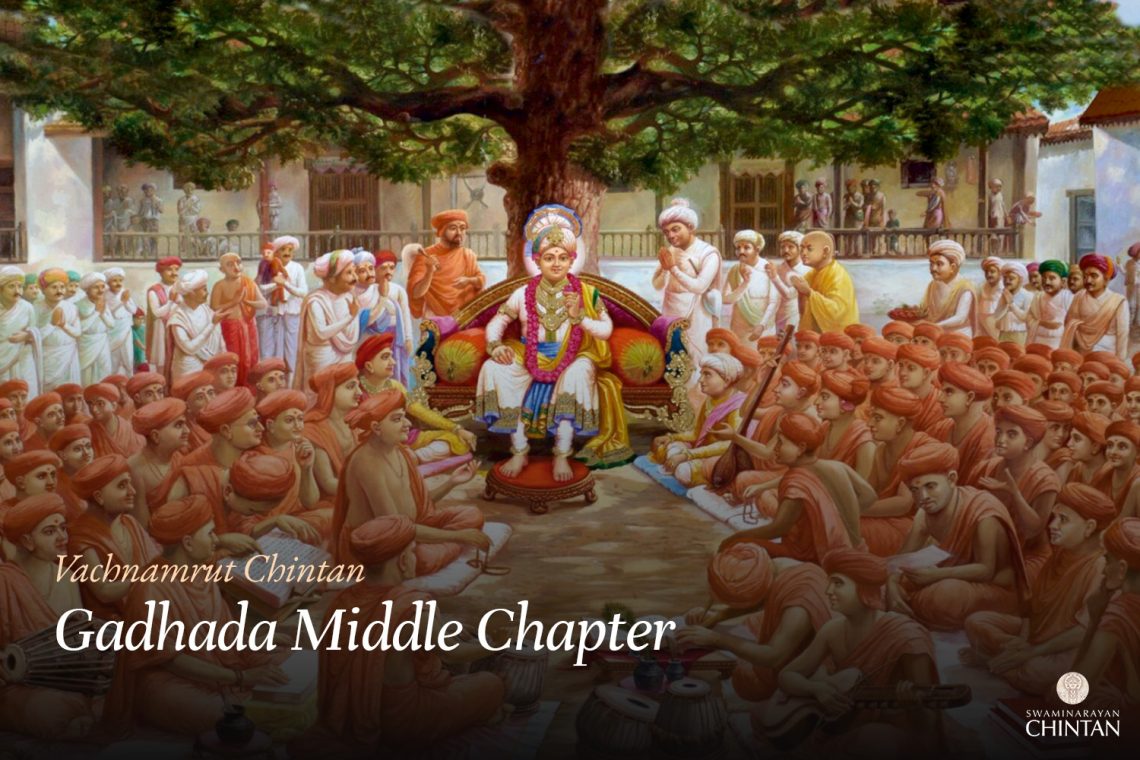Central Insights:
- Listening to the scriptures and doctrines of a shushkajnani (one who possesses dry knowledge) destroys upasana (worship) from the heart of the soul.
Key Points:
- One should listen to and associate with scriptures that foster pativrata bhakti (devotion akin to a faithful wife’s devotion) towards Bhagwan.
Explanation:
In this Vachanamrut, Maharaj is deeply saddened, and tears begin to fall from His lotus eyes. Maharaj says, “Today, I listened to the scriptures of a shushkajnani just to understand their doctrine, and it has caused me great distress. This is because, through such knowledge, the upasana of a devotee’s servant-master relationship with Bhagwan is disrupted. This leads to the heart becoming impartial, and one may begin to worship other deities.
Maharaj continues, saying, “Today, I was resting after listening to the commentary on the Bhagavad Gita by Ramanujacharya and had a dream where I went to Golok (the divine abode of Bhagwan Shree Krishna). There, devotional songs were being sung, and they were the songs of Muktanand Swami and Brahmanand Swami. I, too, began to sing along and sway in bliss. As I swayed, I thought to myself, ‘Those who have forsaken such supreme bliss and devotion, and instead have become false intellectuals, thinking of themselves as Bhagwan, are truly wicked.’ Therefore, I decided to write a letter outlining how one should avoid listening to such scriptures that may cause a person to fall from devotion and dharma.”
Upon this, Maharaj had Shukanand Swami write a letter to all, instructing that the devotees of Bhagwan must possess the same faithful devotion towards Bhagwan as Sitaji had towards Ramchandraji. One must practice the nine types of devotion towards Bhagwan. And if Bhagwan is not manifest on earth, then one should worship and serve His pratima (idol). However, one must not worship any other deities besides Bhagwan. Even if a sadhu has attained siddhagati (the state of a perfected soul), one must not worship them either. If one does so, their pativrata nature is lost, and their devotion becomes like that of a prostitute.
Maharaj emphasizes that one must firmly adhere to their varna and ashram dharma. Those who follow this command will develop steadfast devotion towards Bhagwan, while those who do not will have devotion akin to that of a prostitute. Thus, Maharaj instructs everyone to act accordingly.
Glossary
| Upasana – Worship and devotion The practice of deep meditation and attachment to Bhagwan. |
| Pativrata Bhakti – Faithful Devotion Devotion to Bhagwan akin to a wife’s unwavering fidelity to her husband, marked by exclusivity and loyalty. |
| Golok – The divine abode of Bhagwan Krishna |
| Pratima – Idol or Murti A representation of Bhagwan used in worship when He is not manifest on Earth. |
| Siddhagati – State of a perfected soul A spiritually advanced state attained by a sadhu, though not equal to Bhagwan. |
| Sitaji – Devoted wife of Bhagwan Ram An exemplar of unwavering devotion and faithfulness, used as a metaphor for steadfast devotion to Bhagwan. |
| Varna-Ashram Dharma – Duties by caste and stage of life A framework for living a disciplined and righteous life as per one’s role and responsibilities. |
| Vedanta – Conclusion of Vedas The ultimate philosophical teachings of the Vedas that describe the nature of God and liberation. |
| Prostitute-like Devotion – Impure and insincere devotion Devotion directed towards multiple entities, lacking exclusivity and loyalty to Bhagwan. |

